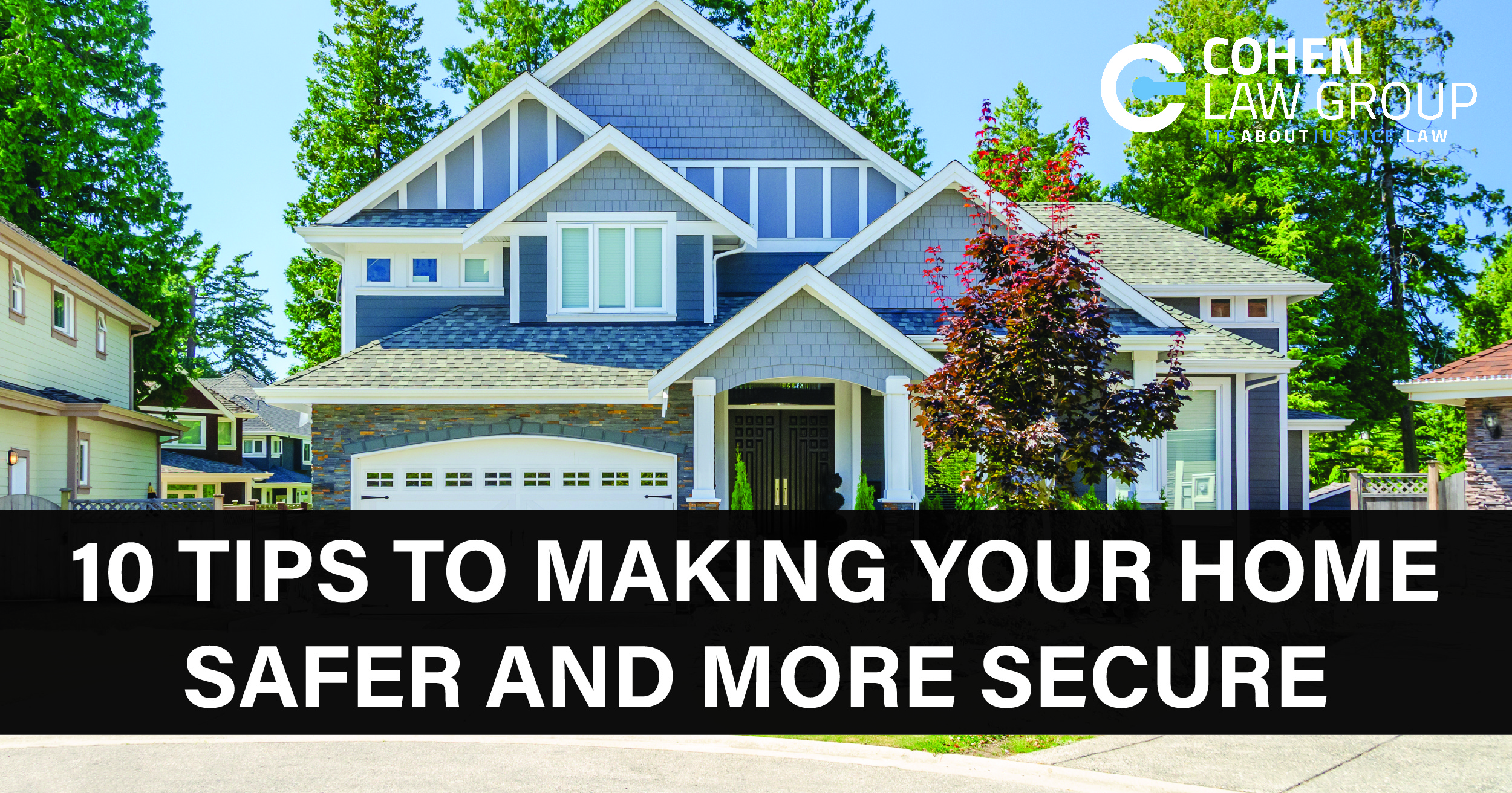As a new homeowner myself and still with young kids in the home, I did some research on ways I
could improve the safety of my home. Both, while I am home and away. Below you will find ten tips from
different sources that I used to make my home safer that I thought would be good to share.
TIP #1: SECURE THE DOORS
Don’t help a burglar stroll in through the front door (34% of them do!). Inspect all of your
exterior doors to make sure the door frames are strong, the hinges are protected, and—if your door has a
mail slot—that someone can’t reach through it to unlock the door.
If you’re moving into a residence that someone else used to call home, change the door locks.
That way you won’t have strangers out there with a key to your house, and you can make sure your locks
are the best on the market.
Some other helpful ways I found to secure your door include:
- Install a deadbolt
- Add a strike plate.
- Upgrade to smart locks.
- Boost security with a video doorbell.
TIP #2: MAKE SURE YOUR WINDOWS ARE SECURELY LOCKED
According to theft expert Dr. Ben Stickle, windows are “a common entry point for criminals” and
may be left shut but unlocked by the previous homeowner. Plus, manufacturer latches on windows aren’t
always effective—and sometimes they’re downright flimsy.
If you don’t like the looks of your window latches, beef up security with aftermarket window
locks or key-operated levers. But you don’t have to stop there. Other good ideas I found to help
make your windows safer include:
- Reinforce glass with window security film.
- Install window sensors or glass break sensors.
- Add window bars.
- Plant prickly bushes under first-floor windows (but be sure to keep them trimmed).
TIP #3: LIGHT UP YOUR LANDSCAPE
Vandals, burglars, and other criminals don’t like to be in the spotlight. Keep them at bay with
ample outdoor lighting. Place lights around your front and back yards, along pathways, and near the
garage and other outdoor structures. Not only will you make intruders skittish, you’ll also cut down your
risk of a stumble on your way up the front steps. Some other helpful ways to light up your landscape
include:
- Use motion-activated lights.
- Save energy with solar-powered lights.
- Use a smart outlet to put outdoor lights on a timer.
- Set up schedules with smart light bulbs.
TIP #4: SET UP A SECURITY SYSTEM
Your new home should have some form of a security system, whether it’s a basic DIY system or
one that comes with professional monitoring and home automation features. Today there are plenty of
home security options for every budget and every level of protection.
To choose a system that you’re comfortable with, Dr. Stickle recommends evaluating the needs of
your neighborhood and your house. “Once you know the likely risks,” he explains, “evaluate your home
to see what is needed to protect it.”
You can contact your local police department for neighborhood crime statistics and help doing a
home security evaluation of your home.
And keep these factors in mind as well:
- DIY installation vs. professional installation
- Customer service and brand reputation
- Smart home capabilities
- Up front and monthly costs
- Extras like smoke and carbon monoxide monitoring
TIP #5: DON’T FORGET TO SECURE YOUR GARAGE
This entry point to your home is becoming more popular with criminals. And even if they can’t access
your house, chances are you have plenty of good stuff stored in the garage. Make it a habit to lock all
doors to the garage—both interior and exterior.
You may also consider keeping your garage door opener in the house. That way, a burglar can’t
grab it out of your car. And if you use a security code to open the garage, make sure you keep it secret
and never enter it in front of delivery people, neighbors, or anyone else.
Here are some more easy ways to secure the garage.
- Upgrade to a smart garage door opener.
- Cover windows to hide the goodies inside.
- Secure garage doors with extra locks.
- Use home automation—and never leave the garage door open again.
- Install a driveway alarm.
TIP#6: LOCK YOUR WIFI NETWORK
Your home wireless network is a doorway to your personal and financial information. And if you
use home automation, it can also make your house vulnerable to a break-in. If your Wi-Fi network is
connected to smart home gadgets or your security system, it could give criminals direct access to your
home. But you don’t have to leave yourself vulnerable. Use some of the tips and tricks I found to keep
hackers off your home network.
- Secure your wireless router.
- Enable WPA (Wi-Fi Protected Access) or WPA2 encryption.
- Rename and hide your home network.
- Use a firewall.
- Install antivirus and anti-malware protection.
- Create strong passwords.
- Using a virtual private network (VPN) is one of the best ways to secure your internet
connection
TIP #7: ELIMINATE HIDING PLACES
Trees and shrubs may give your house curb appeal, but they also give burglars a handy place to
hide. Trim down trees and plants close to your home that could be used for cover. Opt for smaller flowers
and bushes instead. If you have trees near windows, either remove them or reinforce those windows with
extra security. And don’t neglect the rest of your home’s exterior. Use these best practices to keep things
locked up tight:
- Always put away stools and ladders.
- Lock gates, sheds, and other outdoor buildings.
- Don’t tempt thieves by leaving pricey goods on display in the yard.
- Add security signs and stickers—even if you don’t have a security system.
- Learn other tips and tricks for burglar-proofing your backyard.
TIP #8 ADD SECURITY CAMERAS
You’ve probably seen headlines about burglars and porch pirates being foiled by security camera
footage. This is one home security solution that works as both a deterrent and a means to get justice. You
can get security cameras that are part of a complete home security system, or you can use cameras that
work on their own. Whichever way you go, they recommend using a security camera with a mobile app,
so you can see footage in real time and store it if you ever need to go to the police. Take proactive
measures to protect your cameras from hackers too.
Look for the following camera features when making your purchase:
- Motion detection
- Night vision
- Wi-Fi capability
- Two-way talk
- Local or cloud storage
- Weatherproof casing for outdoor cameras
TIP #9 GET A STRONG SAFE FOR KEEPING IMPORTANT AND EXPENSIVE ITEMS
In the event that someone gets by your other home security strategies, make sure that valuables
are protected. An in-home safe is a secure depository for everything from jewelry to vital documents like
passports. You want a safe that is fire-resistant, waterproof, and heavy enough that a thief can’t walk
away with it.
Follow these suggestions to get the most protection from your safe:
- Look for safes with redundant locks (that’s two locks on one safe).
- Select the right size safe for the valuables you want to protect.
- Decide if you want a portable safe or one that’s anchored.
TIP #10 GET HOME AUTOMATION
If you’ve been tempted to turn your regular house into a smart home, security is one compelling reason to
follow through. Home automation gives you remote (or scheduled) control of lights, door locks, security
cameras, smoke alarms, and other safety devices. You can get real-time alerts about suspicious activity so
you can respond quickly and thwart potential thieves. Here are some of good ways to use home
automation to increase security:
- Schedule lights (and your TV) to turn on and off when you’re on vacation.
- Scare away porch pirates with two-way talk through a smart doorbell.
- Get an instant video feed whenever someone walks up your driveway.
- Check on a smoke or CO alarm and cancel false alarms from your smartphone.
In addition to the above, making sure your home is protected with the right insurance is very important to
keeping your home safe and secure. Whenever you have to file a claim against your residential or
commercial property insurance, there are certain rules and requirements that must be strictly adhered to.
This can be a daunting process and most homeowners don’t have the expertise of facilitating the claim
process. The attorneys at Cohen Law Group are not just available for litigation purposes. We will assist
you with your claim from the start to finish. If you have any questions related to this process, please
contact us at our office to speak with one of our highly trained attorneys at 407-478-4878.
ADAM CHAPPEL, ESQ.
REFERENCES/RESOURCES:
https://www.reviews.org/home-security/ways-to-make-home-safer/\
https://www.safewise.com/blog/10-simple-ways-to-secure-your-new-home/
https://www.newhomesource.com/learn/home-security-tips/








